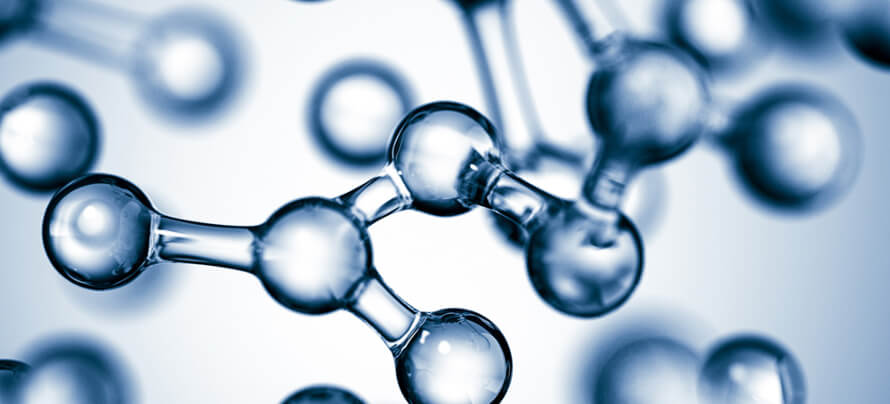Key Takeaways
- Hyaluronic acid is a naturally occurring compound that helps keep water within the skin and joints.
- While it’s technically very important for the body, rapid metabolism in the gut means that oral supplementation does not work as effectively.
- The only scientifically proven use of hyaluronic acid is for preventing dry lips in the form of lip balm.
Us athletes have a unique view into some supplement genres, in particular joint health supplements.
Most youth never consider their joint health since, well, if it works then it works—no need to overthink it.
Weightlifters though? Our joints do NOT like us at times, causing us to look into joint health supplements. It started with glucosamine and chondroitin, which is now the most common joint health supplement, but athletes have since extended far beyond that pairing.
This trailblazer attitude has some unexpected side-effects, namely we get major insight into some supplements that can help our parents and grandparents.
And, of course, we learn what doesn’t work so they don’t need to waste money.
So, what about hyaluronic acid, the new joint supplement that’s all the rage? Spoiler—it’s not a good joint health supplement, but why isn’t it? Does it have any other potential benefits and is there even a single niche we can utilize?
As such, I introduce hyaluronic acid. The glutamine of joint health supplements except a wee bit better.
Table of Contents
+
What Is Hyaluronic Acid?

Hyaluronic acid is a molecule, occurring normally in our bodies, that’s known as a “glycosaminoglycan”—a chain of sugar molecules that happen to contain some nitrogen groups normally only seen in amino acids.
Hyaluronic acid most famous for its physicochemical (physical and chemical) properties where, due to the specific sugars it uses, it’s able to retain up to 1,000 times its own weight in water both inside and outside of the human body. It’s more or less a little sponge of a molecule.
This led to hyaluronic acid first being tested for usage in hydrogels, creams, and foams. We tend to forget that when we supplement a pill that the pill, itself, contains things we’re putting in our bodies—just as gelatin is important to capsules, hyaluronic acid is useful for things that contain moisture.
That purpose, however, is not what you’re reading this article for. Just because it can make gels doesn’t mean it can make us healthier or happier. So, does hyaluronic acid have any healthful reason to supplement with it?
Why Do People Supplement with Hyaluronic Acid?
The moisture-retaining properties of hyaluronic acid have led to people investigating it mostly for joint health and skin care.
For joint health, the water-retaining properties help keep synovial fluid healthy. Synovial fluid is a fluid found in many of our joints that helps to lubricate them and keep them moving effortlessly—failure to have hydrated joints can lead them to become “creaky.”
For skin health, all skin has a moisture content that helps to protect the skin and indirectly support other aspects of skin health (reasonable oil levels, elasticity, etc.).
Throughout the aging process our skin loses moisture content thought to be related to less hyaluronic acid content, among other factors. A commonly cited number is that by the age of 75 we have about a quarter of the hyaluronic acid in our skin as we did at 19.
As you may have noticed, the two major claims here are issues that come with age.
Hyaluronic acid is sometimes stated to have “anti-aging” properties, but they are not inherent. Rather than making your body younger it just, if successful, makes you look and feel younger. This may be a “po-tay-toe, po-tah-toe” issue to some but it’s worth mentioning outright.
Finally, some people believe that you don’t necessarily need to wait for your own hyaluronic acid levels to drop before you can replenish their levels. Some youth without any issues use hyaluronic acid anyways in hopes of getting more benefits than what our body normally allows.
So, which of these claims are true? Is this an issue like glucose where oral ingestion simply increases levels in the body, or is this a glutamine issue where oral supplementation is useless due to how your body processes it?
Can we simply eat hyaluronic acid and call it a day?
Let’s find out.
What Are the Benefits of Hyaluronic Acid?
Hyaluronic acid has a deceptively large amount of studies on it. 1,480 clinical trials in total but, only 17 on supplemental hyaluronic acid (the rest being studies investigating the body, but not in regards to supplementation).
The studies we do have seem to shed some light on the following benefits:
- Hyaluronic acid and joint health
- Hyaluronic acid and skin health
- Hyaluronic acid and bone regeneration
Let’s look at each in turn.
Hyaluronic Acid and Joint Health

Hyaluronic acid has been used in numerous studies on people with osteoarthritis where injections have led to improvements in function and movement—even being found to help cartilage regeneration once.
The reason these studies use injections is simple, hyaluronic acid is quickly metabolized and degraded in the human body. Hyaluronic acid actually has its own set of enzymes degrading it, the hyaluronidases, which try to prevent abnormal levels.
Furthermore, drugs have a concept known as in situ which refers to how long the drug stays at the target tissue—if something builds muscle you want it, you know, in the muscle for a few hours so it can do its job.
Hyaluronic acid is simply too water soluble. It gets degraded quickly, removed from the tissue quickly, yet for it to work it needs to stay there for a long time.
There are some modifications of the hyaluronic acid molecule to make it more resilient, via cross-linking or perhaps acetylation, but the solutions aren’t perfect.
Finally, it’s not like hyaluronic acid is completely like glutamine in the sense that there’s no hope for oral supplementation. Glutamine becomes damn near useless for muscle building when orally ingested but hyaluronic acid has a bit of hope.
Research from the University of Tokyo has found success with 200 mg oral hyaluronic acid in easing symptoms of knee arthritis but the benefits were quite small—many times similar to placebo.
The reason hyaluronic acid seems to work even when taken orally is not clear, but it’s either due to pure chance (a false positive that comes from limited studies) or perhaps not all the HA is metabolized and a bit gets through.
Other oral studies have been conducted with 60 mg hyaluronic acid or more but, unfortunately, hyaluronic acid is confounded with other supplements.
Despite the major role of hyaluronic acid in our joints, studies that look into oral supplementation are limited and not overly promising.
Hyaluronic Acid and Skin Health
Hyaluronic acid and skin health are intimately linked, but not in the way you would expect.
Just as you’d take a heart health supplement to reduce blood pressure, or an anti-diabetes supplement to reduce blood glucose, many skin health supplements show their usefulness by increasing hyaluronic acid levels in the skin.
So hyaluronic acid isn’t the primary acting agent but, rather, the ultimate goal.
This can be seen with supplements like aloe vera, pycnogenol, and even collagen peptides where they are deemed to be effective by increasing hyaluronic acid content in the skin—also improving physical properties of the skin like moisture content and elasticity, of course.
The people in these studies don’t consume hyaluronic acid directly though. When we look for studies that do include supplementing, rather than synthesizing, hyaluronic acid we once again find that the evidence is surprisingly limited.
Researchers from Toho University in Japan have found, with 120 mg hyaluronic acid supplementation over 3 months, supplementation was able to slightly reduce wrinkles and increase suppleness.
That’s about it.
Oral supplementation of hyaluronic acid isn’t well supported by evidence for improving skin health.
Hyaluronic Acid and Lip Health
If hyaluronic acid works best in a gel based form that stays on the target tissue for a long period of time, how can we best make this work?
Lip balm, perhaps. Stays on the lips for a while, can carry it around and reapply it whenever you want, seems quite feasible. Is it studied?
Yes, actually.
We’re not just talking about injecting hyaluronic acid in your lips either, although that seems to work well, but a study from the Journal of Drugs in Dermatology found that application of a lip balm for four weeks (aiming to get coverage for at least 8 hours a day) was effective in reducing dryness of the lips and increase plumpness.
Despite its weakness in directly helping joints and the skin, hyaluronic acid seems to be an effective addition when added to a lip balm to reduce lip dryness.
Bonus: Hyaluronic Acid and Bone Regeneration
Hyaluronic acid has been tested, and found to be useful, in accelerating bone repair.
While this is an impressive and somewhat unique property, only being seen with the joint health supplement cissus quadrangularis previously, there is a catch—hyaluronic acid is used via direct application to bone tissue via gel, or via injections in animal joints.
This opens up some . . . “logistical” problems . . . since we can’t just pull apart our flesh and apply a cream to our bones directly. Furthermore, injecting something right into your joints isn’t what I would call an “at home remedy.”
However, it could be useful for teeth as a few studies have noted. Teeth are the only bone we can directly apply hyaluronic acid to, and anything that could somewhat help them regenerate could go a long way in preventing cavities.
Unfortunately, no studies exist looking at hyaluronic acid toothpaste. The studies we do have are for dentistry, where the dentist directly applies gel during appointments, and are not practical for our purposes.
Hyaluronic acid has the potential to be a useful supplement for tooth health and bone regeneration. Right now we can’t confirm whether it has any use outside of the dentist’s office.
What Does Hyaluronic Acid Not Do?

Given the lackluster benefits of oral supplementation thus far, you may feel like you’ve already read this section.
Perhaps, but there’s one other claim that’s even less supported than those as they don’t even have a single study to back them, and that pertains to hyaluronic acid being used to improve hair and nail health.
Hyaluronic Acid and Other Aesthetics
Hyaluronic acid has mild benefits for skin health, maybe reducing wrinkles, and has shown success in improving moisture content when directly applied to the lips in the form of a balm.
The latter isn’t necessarily a healthy thing to do, but nor is it unhealthy. Increasing moisture content of the lips is only useful if you have uncomfortable dry lips, and may make the lips look better.
These two uses, minor increases in moisture content, are the only known uses of hyaluronic acid at this moment in time. Other claims, such as improved hair and nail quality, are not supported by evidence.
While hyaluronic acid may be useful for lips, and perhaps skin, it has no evidence for helping any other beauty-related goal.
What Is the Clinically Effective Dose of Hyaluronic Acid?
While we won’t discuss dosages for injections of hyaluronic acid since if you’re in a situation where a professional can provide injections they’d know more than I do. I have some basic oral recommendations though.
For joint health, if there’s to be any benefit with hyaluronic acid then it might be seen with a low dosage in the range of 60 to 200 mg once daily with a meal. This is a similar dosage range to the study using oral hyaluronic acid for skin care.
The effect isn’t strong enough to be relevant on it’s own but it could be a nice addition to an already effective joint health supplement since the physical size, and cost to add, is fairly low.
Finally, if you want to use hyaluronic acid in the form of a lip balm, gloss, or gel then just remember that you need to have a large degree of exposure. A single application in the morning isn’t enough, try to get about eight hours of coverage a day, reapplying whenever your lips feel a bit dry.
What Are the Side Effects of Hyaluronic Acid?
There are no reported side-effects with topical application or oral ingestion of hyaluronic acid.
Who Should Supplement Hyaluronic Acid?

At this moment in time almost every potential purpose for hyaluronic acid usage is in the hands of medical professionals who can apply injections of the stuff.
The only practical usage of this supplement, in my opinion, would be the lip balm approach. Oral supplementation of hyaluronic acid for both skin and joint health is simply not strong enough to concern yourself with since there are better options out there.
However, for dry lips? We don’t have too many options so hyaluronic acid has a nice niche there.
The Bottom Line on Hyaluronic Acid
At the end of the day hyaluronic acid is a very niche supplement.
While intimately linked to how joints can hydrate themselves, we can also synthesize it within our own bodies. Synthesis is important for joint health but simply consuming more hyaluronic acid does not seem to be an effective treatment.
If we are to find maximal benefit to joint health and skin health, the two parameters where hyaluronic acid has a bit of promise, then we need to take other supplements that help maintain proper synthesis rates.
As for hyaluronic acid itself, it really only holds promise in instances where a gel can be applied. This is because it needs a long exposure time to work, and this only seems to be practical when hyaluronic acid is used in some manner of lip gloss.
Even here, however, it’s usage as a “beauticeutical” (a term used for supplements that improve beauty) is limited to just the lips. Hair and nails are not investigated and don’t have much rationale as to why they would even be helped.
Hyaluronic acid is just something to look for in chapstick. Nothing more, nothing less.










